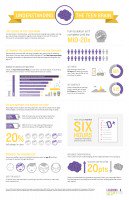I am the father of a 17 year old. And like most teens, he mystifies me. He is bright, good-humored, and conscientious, but he still does things that defy logic. When I ask him why he did something, I often get an answer that at first makes sense to him, but then he realizes that what he did was a total mystery to both of us! I’ll ask, “Why did you take that turn so fast in the car?” His answer is well-meaning and genuine, but ends with the concession, “I’m not sure.” This leads to the real question: what exactly is going on in his brain?!
The brain is the least understood organ of the human body. It is a wonderland of electrical impulses that directs what the body does, what we think, and what we choose. Until 20 years ago, we only had minor glimpses into how the brain did its thing!
MRIs and other tools now give us insights into the workings of the brain that are revolutionary! We now understand the functions of different parts of the brain, as well as how the brain adapts over time. That last point is a key to understanding the teenage brain: it is not yet fully developed! Teenagers may look like mature adults, but because the part of their brains that makes judgements, evaluate risks, and control impulses isn’t fully developed, they act in ways that defy reason. In a recent article in the Washington Post, Frances Jensen, the chair of the neurology department at the University of Pennsylvania’s Perelman School of Medicine, explained, “It’s like a Ferrari without brakes.”
One positive is that what a teen experiences can still create great developmental advantages. Experiences are still formative for a teen. For instance, we have known for decades that teenagers require more sleep than adults to function effectively. The opportunity here is that habits can translate into huge benefits as the brain continues to develop. Getting the proper amount of sleep can make a significant difference! Information learned during the day has more time to be processed and understood. The danger is that lack of sleep, or use of brain-altering drugs or alcohol, can significantly hamper this process. For more on this, see the recent article in the New York Times. How much sleep does a teen need? On average, 8 to 10 hours, with 9.25 hours being a widely accepted norm.
One advantage of online learning with K12 is that the student is not beholden to the bell schedule of most schools. Traditional high schools begin before 8 AM and this means a wake-up time of between 6 AM and 7 AM. Therefore, the average student should be in bed between 8 PM and 11 PM on school nights, and perhaps earlier! Most of the time, the online learning experience may begin later and usually does not entail transportation.
Other good news is that the brain is changing, and the capacity to learn can be affected. Studies show that one in three adolescents increase their IQ by the time they mature! Unfortunately, one in three also show decreases in IQ.
Back to my son, and the approximately 1,700 students I taught for that matter. Clearly they need sleep, stimulation, and guidance. While they often do not seem to listen to a parent’s sage advice, it is processed, and eventually integrated into the mature brain. Judgment improves, as does risk management. At some point, they drive better, make better decisions with relationships, and in a relatively short time, succeed as productive, independent individuals. What are some things you notice about your teen that makes you wonder about their judgement? We would love to hear your stories!
For more ways to decipher the teen brain, view our infographic, Understanding the Teen Brain.






































